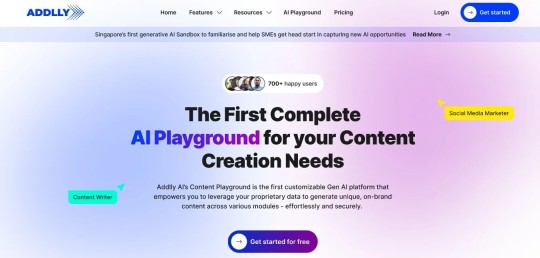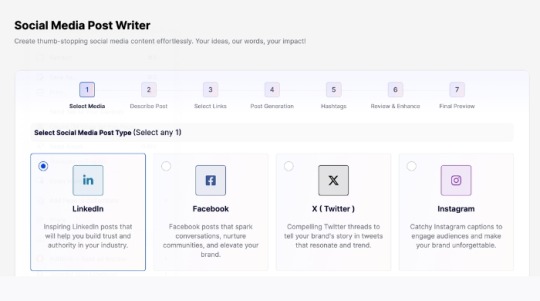Don't wanna be here? Send us removal request.
Text
What is 'No Prompt' AI? The Future of Content Creation
As a content marketer, one of my biggest frustrations has always been the time it takes to research and write blog articles, social media posts, and other digital content. Coming up with engaging topics, researching facts and figures, structuring my content strategically - it all adds up to a lengthy process that I have to repeat almost daily to keep my company's online presence fresh and relevant.

That's why I was so excited to discover Addlly.ai and experience their No Prompt AI technology for myself. As the name suggests, No Prompt AI tools like Addlly remove the need for lengthy prompts and allow users to generate helpful, optimized content with just a few clicks or simple inputs.
The first Addlly tool I tested was their 1-Click Blog Writer. After entering a keyword and selecting a topic, I hit "Generate" and within seconds had a fully-formed, optimized blog article on the chosen subject ready to publish. The article included relevant subheadings, insights from industry experts, facts, figures and quotes - all laid out logically and seamlessly. I was blown away by how human-like yet targeted the writing was for my audience without any input beyond the initial keyword and topic.
As an added bonus, the 1-Click Blog Writer also provided me with optimized meta descriptions, titles and FAQ sections to boost my SEO. The time savings alone has been massive compared to researching and writing blogs manually.
Naturally, I was eager to test out Addlly's other No Prompt AI tools as well. Their Social Media Post Generator allows me to input a brief description and topic to receive ready-made posts tailored for platforms like Facebook, Twitter, LinkedIn and Instagram. Again, all I have to do is select from the optimized options provided - no crafting lengthy prompts required. The AI analyzes trends and hashtags to ensure each post will engage followers.
Clearly, Addlly's No Prompt AI model represents a total paradigm shift in content creation that improves productivity, quality and results like no other solution on the market. By understanding marketing nuances, industry trends and my target audience's language from just a few signals, their AI becomes my invaluable digital assistant - crafting precisely what I need without wasted time or effort on my end. The brand-aligned, human quality of the text it generates has even impressed clients and CEOs.
If you're tired of the grind and inefficiency of manual content creation processes, it's time to put Addlly's revolutionary No Prompt AI model to work for your business. You'll gain back countless productive hours each week while producing unparalleled quality and results. Your digital marketing will never be the same, and customers will thank you for the engaging, targeted content. The future of zero-friction marketing is here thanks to Addlly.
1 note
·
View note
Text

0 notes
Text
Want to skyrocket your social media engagement? 🚀 Here's a simple trick: STOP selling and START conversing! 💬 Instead of pushing products or services, focus on building relationships with your audience. Ask questions, share behind-the-scenes content, and show off your brand's personality. Addlly AI social media post generator uses AI-powered technology to craft engaging, conversation-starting posts for you. Try Addlly AI today and watch your social media engagement soar! 🚀
0 notes
Text
Generative AI in Marketing
Introduction
Generative AI has become a buzzword in recent years, and for a good reason. This revolutionary technology is transforming various industries, including marketing. But what exactly is generative AI, and how is it changing the marketing landscape? This article will explore the fundamentals of generative AI, its applications in marketing, and how businesses can leverage this technology to stay ahead of the competition.
What is Generative AI?
Generative AI refers to a class of artificial intelligence models that can generate new content. Unlike traditional AI, which relies on predefined rules or datasets, generative AI can create original content by learning patterns and structures from the input data. The most common types of generative AI models include:
Generative Adversarial Networks (GANs): These models consist of two neural networks, a generator and a discriminator, that work together to produce realistic data.
Variational Autoencoders (VAEs): These models learn to encode input data into a latent space and then decode it to generate new data.
Transformers: These models, such as GPT-3, are designed for natural language processing and can generate human-like text based on the input data.
Applications of Generative AI in Marketing
Generative AI is revolutionizing marketing by enabling businesses to create personalized content, optimize campaigns, and improve customer engagement. Here are some of the key applications of generative AI in marketing:
Content Creation
One of the most significant benefits of generative AI is its ability to create high-quality content quickly and efficiently. Marketers can use generative AI to:
Generate Blog Posts: AI-powered tools can create well-researched and engaging blog posts tailored to specific audiences. For example, Addlly AI offers content generation tools like SEO Blog Copilot and 1 Click Blog Writer that help marketers create optimized blog posts effortlessly.
Write Social Media Posts: Generative AI can produce compelling social media content that resonates with followers and drives engagement.
Create Ad Copy: AI can generate persuasive ad copy that targets the right audience and improves conversion rates.
Personalization
Generative AI enables marketers to deliver personalized experiences to their customers. By analyzing customer data and behavior, AI can create tailored content and recommendations that meet individual preferences. This personalization can be applied to:
Email Campaigns: AI can craft personalized email content that speaks directly to the recipient's interests and needs.
Product Recommendations: By analyzing purchase history and browsing behavior, AI can recommend products that customers are more likely to buy.
Website Content: Generative AI can dynamically adjust website content based on user preferences, enhancing the overall user experience.
Optimization and Testing
Generative AI can also help marketers optimize their campaigns and conduct A/B testing more efficiently. AI can:
Analyze Campaign Performance: AI-powered analytics tools can provide insights into campaign performance, identifying what works and what doesn't.
Generate Multiple Variations: AI can create different versions of ad copy, images, and other content, allowing marketers to test and compare their effectiveness.
Predict Outcomes: AI can predict the success of different marketing strategies, helping businesses make data-driven decisions.
Customer Engagement
Generative AI can enhance customer engagement by providing interactive and immersive experiences. For example:
Chatbots: AI-powered chatbots can engage with customers in real-time, answering questions, providing support, and even making product recommendations.
Virtual Assistants: Generative AI can power virtual assistants that help customers navigate websites, find products, and complete purchases.
Interactive Content: AI can create interactive content such as quizzes, surveys, and games that engage users and keep them on the site longer.
Case Studies: Generative AI in Action
To illustrate the impact of generative AI in marketing, let's look at some real-world examples:
Case Study 1: Sephora
Sephora, a leading beauty retailer, uses generative AI to enhance its customer experience. The company employs AI-powered chatbots to assist customers with product recommendations and support. These chatbots analyze customer data to provide personalized recommendations, improving customer satisfaction and driving sales.
Case Study 2: Netflix
Netflix leverages generative AI to personalize its content recommendations. By analyzing user behavior and preferences, Netflix's AI algorithms suggest movies and TV shows that users are likely to enjoy. This personalization has helped Netflix maintain high user engagement and satisfaction.
Case Study 3: Coca-Cola
Coca-Cola uses generative AI to create personalized marketing campaigns. The company employs AI to analyze consumer data and generate tailored content for different segments. This approach has improved the effectiveness of Coca-Cola's marketing efforts and increased brand loyalty.
The Future of Generative AI in Marketing
As generative AI continues to evolve, its applications in marketing will expand. Here are some trends to watch for in the future:
Hyper-Personalization
In the future, generative AI will enable even more granular levels of personalization. Marketers will be able to create highly tailored content that speaks directly to individual customers' needs and preferences. This hyper-personalization will improve customer satisfaction and drive loyalty.
Enhanced Customer Insights
Generative AI will provide marketers with deeper insights into customer behavior and preferences. By analyzing vast amounts of data, AI will uncover hidden patterns and trends that can inform marketing strategies. This will enable businesses to stay ahead of the competition and better meet customer needs.
Voice and Visual Content
As AI technology advances, generative AI will be able to create more sophisticated voice and visual content. This includes generating realistic voiceovers, creating virtual influencers, and producing high-quality images and videos. These capabilities will open up new possibilities for engaging customers and delivering compelling marketing campaigns.
Integration with Other Technologies
Generative AI will increasingly be integrated with other emerging technologies, such as augmented reality (AR) and virtual reality (VR). This integration will enable marketers to create immersive and interactive experiences that captivate audiences. For example, AI-generated content could be used in AR apps to provide personalized product recommendations in real-time.
How to Get Started with Generative AI in Marketing
If you're interested in leveraging generative AI for your marketing efforts, here are some steps to get started:
Identify Your Goals
First, determine what you want to achieve with generative AI. Are you looking to create content, personalize customer experiences, or optimize campaigns? Clearly defining your goals will help you choose the right AI tools and strategies.
Choose the Right Tools
There are many generative AI tools available, each with its own strengths and capabilities. Some popular options include:
Addlly AI: Offers a range of content generation tools, including SEO Blog Copilot and 1 Click Blog Writer. Visit Addlly AI to learn more.
Copy.ai: Provides AI-powered tools for generating ad copy, social media posts, and more.
Jasper.ai: Offers an AI writing assistant that helps create high-quality content quickly.
Collect and Prepare Data
Generative AI relies on data to generate content and insights. Collect and prepare the necessary data, such as customer information, purchase history, and campaign performance metrics. Ensure that your data is clean, accurate, and up-to-date.
Experiment and Iterate
Start by experimenting with generative AI on a small scale. Test different tools and strategies to see what works best for your business. Monitor the results and iterate based on the insights you gain. As you become more comfortable with AI, you can scale up your efforts and explore new applications.
Train Your Team
Generative AI is a powerful tool, but it requires skilled professionals to use it effectively. Invest in training your marketing team to ensure they understand how to leverage AI tools and interpret the results. This will help you maximize the benefits of generative AI and stay ahead of the competition.
Conclusion
Generative AI is transforming the marketing landscape, offering businesses new ways to create content, personalize experiences, and optimize campaigns. By understanding the fundamentals of generative AI and exploring its applications, marketers can harness this technology to stay competitive and meet the evolving needs of their customers. Whether you're looking to generate high-quality content, deliver personalized experiences, or gain deeper insights into customer behavior, generative AI has the potential to revolutionize your marketing efforts.
To learn more about how generative AI can enhance your marketing strategy, visit Addlly AI and explore their range of AI-powered content generation tools.
0 notes